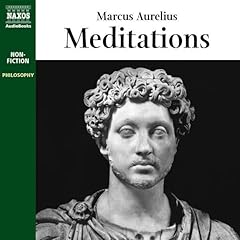
On the Nature of Things
No se pudo agregar al carrito
Add to Cart failed.
Error al Agregar a Lista de Deseos.
Error al eliminar de la lista de deseos.
Error al añadir a tu biblioteca
Error al seguir el podcast
Error al dejar de seguir el podcast
 Exclusivo para miembros Prime: ¿Nuevo en Audible? Obtén 2 audiolibros gratis con tu prueba.
Exclusivo para miembros Prime: ¿Nuevo en Audible? Obtén 2 audiolibros gratis con tu prueba.Compra ahora por $20.56
-
Narrado por:
-
Charlton Griffin
-
De:
-
Lucretius
This famous work by Lucretius is a masterpiece of didactic poetry, and it still stands today as the finest exposition of Epicurean philosophy ever written. The poem was produced in the middle of first century B.C., a period that was to witness a flowering of Latin literature unequaled for beauty and intellectual power in subsequent ages. The Latin title, De Rerum Natura, translates literally to On the Nature of Things and is meant to impress the reader with the breadth and depth of Epicurean philosophy.
The poem's scope, even by modern standards, is staggering. Lucretius peers into the secrets of nature with a kind of innocent curiosity and offers a "scientific" explanation for all sorts of phenomena: stars and planets, oceans and rivers, plant life, reproductive activities, the soul and immortality, and the nature of the gods, among others. According to Lucretius, mankind can be freed from the stifling structures of religion and superstition by studying the works of the Greek philosopher Epicurus. All it takes is the strength of character to look at the natural world in an uncompromisingly level and unemotional way, to observe and live in the world according to precepts laid down by the great Epicurus in the fourth century B.C. That being so, according to Lucretius, it will be possible for man to lay aside superstition and fear and to become as godlike as he can.
Even though humanity was driven by hungers and passions it little understood at the time, Lucretius' bold poem sought to embolden men with the self-confidence to get along in the world without recourse to myths and gods. In order to free themselves, men would have to adopt a personal code of self-responsibility that consisted of living and speaking personal truths founded on the work of Epicurus. On the Nature of Things is about the universe and how men should live in it.
Public Domain (P)2007 Audio ConnoisseurLos oyentes también disfrutaron:




















Las personas que vieron esto también vieron:









decent philosophy
Se ha producido un error. Vuelve a intentarlo dentro de unos minutos.
The senses faithfully serve up how the world is. The stick seems to bend in water because this is the world we live in; it is reason's job to figure out why. It could have been that the senses reported a straight stick in water, but that is not the world we live in. Huzzah for Epicurus and Lucretius!
A Primary Defense of Empiricism
Se ha producido un error. Vuelve a intentarlo dentro de unos minutos.
they fixed the chapter ordering issue
Se ha producido un error. Vuelve a intentarlo dentro de unos minutos.
Where does On the Nature of Things rank among all the audiobooks you’ve listened to so far?
Definitely one of the best.Who was your favorite character and why?
If it were a character, I would say the poetry itselfWhat does Charlton Griffin bring to the story that you wouldn’t experience if you just read the book?
If there were gods, and humans went to battle against them, win or lose, the story ought to be told by Charlton Griffin.Lucretius' De Rerum Natura is a marvel of poetry and philosophy, but you have to already know your classical poetry and philosophy to really savor every drop. But with Charlton Griffin, even those unfamiliar with the materialism, empiricism, hedonism and atheism of epicureanism, will be inspired to seriously ponder these ideas and read further on.
Did you have an extreme reaction to this book? Did it make you laugh or cry?
I had read this book before, but this audio version sent chills down my spine!Any additional comments?
Do yourself and your loved ones a favor, and listen to this audiobook as you sit in front of a nice chimney fire.Lucretius becomes immortal!
Se ha producido un error. Vuelve a intentarlo dentro de unos minutos.
Prior to reading this, I read a biography of Epicurus and Epicurean philosophy. I can see why Lucretius said that Epicurus' brilliance towered over all the other brilliant men. In the end, Lucretius towers over them all.
This is a MUST READ!
Read his own words. A+
Se ha producido un error. Vuelve a intentarlo dentro de unos minutos.


